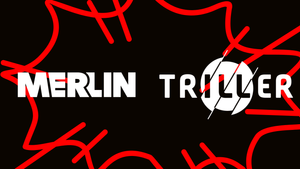Digital licensing organisation Merlin has sued Triller over $2.5 million that it is owed as a result of a so called ‘most favoured nation clause’ incorporated in a licensing deal it agreed with the short form video platform in 2020.
Triller, says Merlin’s lawsuit, has never denied that the $2.5 million is owing, but still hasn’t paid it. It’s by no means the first time a music company has complained about Triller not paying its bills. Both Universal Music and Sony Music previously sued over unpaid royalties.
Those lawsuits were both apparently resolved, with Triller having to fork out more than $4.5 million to Sony, and acknowledging that the Universal lawsuit would “likely result in the payment of settlement amounts”.
The company has seen a string of lawsuits brought against it over the years, with others brought by Wixen, Timbaland and Swizz Beatz as well as an app consultancy Phiture.
Most favoured nation clauses, like the one at the heart of the Merlin lawsuit, are common in digital licensing agreements.
A digital platform and music company agree terms in their licensing deal. But then - because of the MFN clause - if the platform enters into another deal with another music company that offers more favourable terms for the same deliverables, the more favourable arrangement will also apply to the first deal as well.
In its lawsuit, Merlin explains that - under its 2020 deal - if Triller entered into “a more favourable agreement” with another record company, it was obliged to “notify Merlin in writing” and then “offer such incremental payment to Merlin” as was necessary to ensure that the rights organisation was being paid as if the terms of its deal were as favourable as “the relevant more favourable agreement”.
Actually, Triller didn’t notify Merlin in writing when it entered into a more favourable deal with another record company. Instead, Merlin became aware of the more favourable deal when that record company, Sony Music, sued Triller over unpaid royalties in August 2022.
When Merlin became aware of the Sony deal it initially sent a letter to Triller alerting the video platform that its deal with Sony was “a more favourable agreement as defined by the licence agreement and MFN clause”, which meant Triller was now “required to offer Merlin an incremental payment”.
Talks then took place between Merlin and Triller in October and November that year via which “the parties came to an understanding that Triller Inc owed Merlin the sum of $2,550,000”.
Merlin invoiced for that money in December, but the invoice wasn’t paid. “Merlin has followed up with Triller Inc repeatedly regarding the outstanding payment”, says Merlin in its court filing. Despite that, no payment has been made, even though “Triller Inc has never disputed that the payment is owed to Merlin”.
For a time Triller was very much courting the music industry in a bid to match TikTok and other rival video platforms in making it easy for users to legally include music in videos they uploaded to the social media platform. During that time it entered into licensing deals with the major record companies and other music businesses, including Merlin, which negotiates deals for a network of indie labels and distributors.
However, unpaid bills subsequently resulted in criticism and then legal action from some music companies, and Triller then started to let its music licences lapse.
Triller itself took a particularly bombastic stance once its relationships with the music industry started to fall apart, including a claim that attempts to renew its licensing deal with Universal “was just a formality and a courtesy to UMG” and that it had “no use for a licensing deal” with the major.
Triller enjoyed a bit of a surge in 2020 during then President Donald Trump’s ultimately unsuccessful bid to ban TikTok in the US. However, since then it has struggled to stand out in a competitive market place.
In October last year the company appointed a new CEO, Kevin McGurk, and embarked on what it called a “transformation journey”, which McGurk said would “build from our strong roots in vertical video, music and sports, and optimise our expertise in mobile and connected television”.
Those strong roots include Triller’s Bare Knuckle Fighting Championships, which it claims is “quickly becoming the #1 combat sport in the world”.
In corporate terms, Triller merged last year with NASDAQ-listed AGBA. That actually prompts a second complaint in Merlin’s lawsuit, because its 2020 licensing deal also provided a ‘warrant’ allowing it to acquire shares in the Triller company at pre-agreed rates. Triller should have issued new warrants after the merger with AGBA in relation to the new company, but it failed to do so.
“Merlin raised its concerns regarding the warrant in late October 2024”, the lawsuit explains. “Merlin has still not received information regarding how Triller intends to handle the matter. Merlin was promised new warrants in November and Triller has yet to deliver those warrants”.

